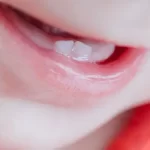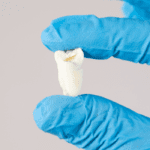Do you experience tooth pain when having hot or iced coffee in the morning? If yes, you are likely suffering from tooth sensitivity.
Tooth sensitivity, also known as dentin hypersensitivity, is a temporary or chronic condition that involves discomfort or pain in the teeth when exposed to hot or cold temperatures.
Many things can cause tooth sensitivity to hot and cold temperatures. The good news? There are treatments available to stop it and prevent it from recurring.
Tooth Sensitivity Causes
Even if you suspect you have sensitive teeth based on experience, you cannot diagnose it yourself. A visit to the dentist is necessary for confirmation. It’s essential to know what causes tooth sensitivity to cold and hot temperatures to take appropriate preventive measures.
Causes of tooth sensitivity to cold and hot temperatures may include:
- Aggressive Brushing: Vigorous and excessive brushing can damage the protective enamel layer of the teeth. When this happens, the second layer of the teeth is exposed, causing tooth pain when consuming something hot or cold.
- Food and Beverages with High Acid Content: Drinking and eating acidic edibles damages the enamel, which leads to tooth sensitivity to hot and cold temperatures. Some everyday examples include coffee, lemonade, soft drinks, and oranges.
- Whitening Toothpaste: While whitening toothpaste can improve your confidence, the included chemicals can be harmful to your teeth. For some people, regular whitening toothpaste usage leads to tooth sensitivity. Other oral care products such as mouthwash containing alcohol can also cause tooth sensitivity to hot and cold.
- Gum Diseases: The accumulation of tartar and plaque along the gum lines can cause infections and inflammations. When not properly treated, they can progress to gum recession. Gum recession causes the nerve endings of the teeth to be exposed and irritated when subjected to hot or cold temperatures.
- Teeth Grinding: Some people grind their teeth while sleeping, while others do it unconsciously. Regardless, teeth grinding has to be avoided. It is one of the most common causes of enamel damage.
- Tooth Decay: Having untreated cavities leads to tooth decay, which is another reason nerve endings get exposed. As previously mentioned, nerve endings can get irritated and cause pain when exposed to hot or cold temperatures.
Tooth Sensitivity Home Remedies
To ease discomfort and relieve pain caused by tooth sensitivity, here are some home remedies you can try:
- Apply vanilla extract.
- Rinse with salt water.
- Rinse with warm water and honey.
- Rinse with green tea.
- Rub turmeric.
These home remedies, however, can only relieve pain and discomfort temporarily. Seeing a dentist for a specific treatment plan is still the best way to go.
Tooth Sensitivity Treatment
Dentists can identify the root cause of your tooth sensitivity and provide proper treatment, such as:
Fluoride Treatment
Fluoride restores minerals to enamel and prevents cavities from building up. To strengthen enamel, dentists may recommend specific fluoride treatments. These include the prescription of fluoride toothpaste and fluoride rinse, which you can use at home. Dentists may also perform in-office therapies in the form of foam, solution, varnish, or gel.
Dental Procedures
There are some dental procedures used to stop tooth sensitivity. Depending on the diagnosis, an appropriate dental procedure will be performed. For tooth sensitivity caused by exposed nerve endings, dentists may apply a composite resin to cover the affected areas.
Tooth sensitivity caused by gum recession can be treated through gum grafting procedures. The said procedure also covers exposed nerved endings and roots to stop irritation and pain. For cases with tooth decay as the root cause, dentists may perform cavity filling or a root canal.
Mouthguards
Some signs of grinding your teeth while sleeping are earaches, headaches, a stiff jaw, and facial pain. If you experience any of these after sleeping, consider visiting a dentist to discuss viable treatments. Usually, mouthguards are provided to prevent unconscious grinding. In cases where tooth enamel damage is already present, fluoride treatments may be prescribed as well.
Dietary Changes
Because some food and beverages cause tooth enamel to be damaged, dietary changes may also be a part of your treatment. Acidic food and drinks must be avoided. Dentists may also recommend certain foods that improve your mouth’s well-being.
Advice
Because dentists are knowledgeable in treating tooth sensitivity, they can advise you about your oral care routine. If there are things that need improvement, they are the best ones to inform you about it. In some cases, they may also recommend a soft-bristled toothbrush to prevent further enamel damage.
Schedule a Dental Visit Today
Tooth sensitivity to hot and cold temperatures can affect your daily life. While home remedies are available to temporarily ease pain and discomfort, visiting your dentist remains the best option.
We at Advanced Dental Group have partnered with the best dentists from different areas to make high-quality dental services accessible to all. If you are looking forward to living without tooth sensitivity, contact us for inquiries. We’ll connect you to the best dentist in your area.





